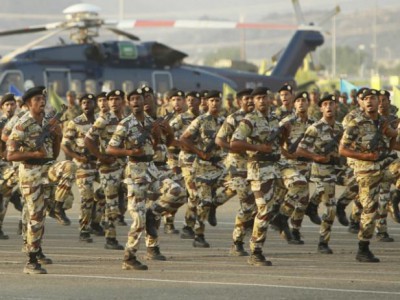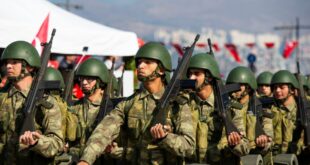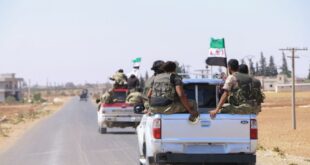Abdel Bari Atwan
As Saudi Arabia announces that it is prepared to deploy ground troops in Syria, we examine Riyadh’s motives and intentions. Is their target really the Islamic State as claimed or does it hope to topple Assad? Or both? What are its chances of success and will other Arab countries enjoin the battle?
In the past, Saudi Arabia always kept its cards to its chest and deliberated long before making an official statement on anything – even something as ground-breaking as the Camp David accords. Now all that has changed and Riyadh has become the news maker, the source of new events and surprises. Its spokesmen do not cease to speak and there is a general rush to meet the media.
Yesterday brought the most astonishing Saudi news story to date when Brigadier General Ahmed, hitherto best known as the spokesman for the Saudi-led assault on Yemen known as ‘Operation Decisive Storm’, announced that the Kingdom has ‘announced its readiness to participate with ground troops with the US-led coalition against ISIL, because we now have the experience in Yemen.’
The timing of this announcement is very telling. In the past few days, Egyptian, Jordanian, Pakistani and Sudanese military units have been gathering in Saudi Arabia for joint manoeuvres, labelled ‘Northern Thunder’ the first of their kind in the region and designed, according to an Egyptian spokesman, to ‘raise professional competence and combat efficiency’.
The Saudi offer of ground troops is dependent on acceptance by the US and will be discussed in Brussels next week at a meeting of the coalition of countries fighting IS.
This escalation comes as Assad’s troops make huge gains in Syria, retaking strategic rebel-held territory in the Alepppo area and breaking the siege of towns like Nubul and az-Zahra. This progress is largely due to the participation of Russian fighter planes offering air cover for the ground troops and has deeply worried Saudi Arabia and her Turkish ally.
While the talk is all about defeating IS, Riyadh actually sees the battles in Yemen and Syria as proxy battles between itself and regional rival Tehran; the sudden push by Iran’s ally, Assad, and superpower Russia is seen as a major threat to Saudi regional influence – hence this rush to change the balance in Syria after five years of hesitation.
We do not rule out the possibility that the reason the Saudi-backed ‘High Negotiations Committee’ opposition delegation was suddenly ordered to leave the Geneva peace conference last week was the gains made by the Syrian army on the ground.
Meanwhile there are many reports of Turkish troops massing on the Syrian border, something President Recep Tayyip Erdogan vigorously denies. The chances of military escalation involving the region’s big powers and even international superpowers (US and Russia) are stronger than ever, especially in the light of the failure to make significant progress in the Geneva talks.
It seems to us that the new sense of urgency (or even desperation) in Riyadh and its allies is generated by anxiety over the potential fall of Aleppo to the regime and not, as claimed, by the necessity to defeat IS.
If Assad retakes the former economic capital it will greatly boost the morale of his troops and further damage the rebel forces, who were weakened by the assassination of Jaish al-Islam commander, Alloush Zahran, at the end of last year.
The Saudi economy is already imperilled by the fall in the price of oil. We are reminded of the words of Professor Paul Kennedy, author of the book ‘The Rise and Fall of the Great Powers’; Kennedy observed the main stages in the decline, and ultimate implosion, of powerful countries:
1) States become powerful due to wealth. They then have to become engaged militarily to defend and expand that power, devoting increasingly untenable proportions of national resources to military activity.
2) Military success (and the maintenance of influence) depends on economic strength; but states apparently at the zenith of their political power are usually already in a condition of comparative economic decline.
3) To maintain power and influence, a state has to ensure a balance between wealth creation and military expenditure – powers in decline almost always hasten their implosion by spending more than they have in the coffers on military adventures and security. This is, for example, what happened to the Soviet Union when it became entangled in Afghanistan in the 1980s – Kennedy, writing in 1988, correctly predicted its demise.
4) Huge expenditure on external military adventures causes growing unrest at home, making the development of an internal agency of destruction – either through revolution or terrorism or both – more likely and more likely to succeed.
Saudi Arabia is not, of course, a huge power; it is not an Empire like the Ottoman Empire or the Soviet Union but these warnings apply to it nevertheless. It has been waging war against Yemen, one of the poorest countries in the world, for 11 months; the Houthi rebels it is battling are by no means as well equipped as the Saudis, having the most basic weapons and very little by way of air power, and yet they remain stubbornly in place. Meanwhile the Saudi economy is facing a record budget deficit of $87 billion for 2016 and has already spent $6 billion bombing Yemen. It has begun dipping into its Sovereign Wealth fund and is selling off its national assets.
One would have expected that, at such a time, it would be reining in its military expenditure, not expanding it massively as Riyadh seems poised to do if the US accepts its offer of ground troops for Syria.
As we have already said, this is a war about regional influence, inflamed by sectarian differences. It could drag the larger powers into direct, rather than proxy, military confrontation, with the US and Europe on the side of Sunni Saudi Arabia and Turkey, and Shiite Iran backed by Russia and China.
Saudi Arabia is in the grip of desperation and panic due to its military and economic failures. The real power behind the throne – 30 year-old Prince Mohammad bin Salman, defence Minister and deputy Crown Prince – may convince the regime to behave like Dostoyevsky’s ‘Gambler’ who, faced with losing everything, throws his last possessions into a final bet in the hopes of recouping it all.
This is the genesis of the offer to intervene on the ground in Syria.
One must hope that the powers would step back from the brink of such catastrophe and that Washington will caution Riyadh against rushing in to confront Assad and the Russian bear that is never far from his shoulder.
 Geostrategic Media Political Commentary, Analysis, Security, Defense
Geostrategic Media Political Commentary, Analysis, Security, Defense





